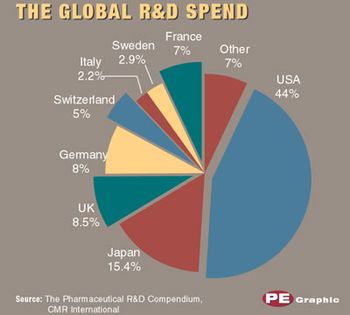
GSK Faces Bribe Charges, Changing of the Guard

As a chemist, a vice-president, and just about everything in between, Sarah Harrison has spent 25 years delivering business excellence and predicting the impact of radical changes in the healthcare environment. Now she leads AstraZeneca in its own multi-faceted transformation.

New markets are a pharmaceutical company's dream. And China, with a population of 1.3 billion-and new membership in the World Trade organization-could be the pharma industry's dream come true. The country's projected growth rate of 1.1 percent per year, which will increase its pharma market by at least $50 million annually, in addition to an increasingly prosperous population with a greater awareness of health-related issues, make the market extremely attractive. (See "People Power,")

Capetown-In March, ruling on a case initiated by the Treatment Action Campaign, Save Our Babies, and the Children's Rights Centre, Judge Chris Botha ordered the South African government to provide the anti-retroviral nevirapine to all HIV-positive pregnant women.

After months of stalemate between the White House and Senate democrats over the appointment of a new FDA commissioner, Health and Human Services secretary Tommy Thompson took a shortcut February 26 and named Lester Crawford deputy commissioner. The move allowed Crawford to start work at FDA immediately, skipping the lengthy Senate confirmation process.

Ed Calesa knows women-or rather, he understands the female market. After starting his career as marketing research manager for Roche, he co-founded Health Learning Systems in 1971 and pioneered the use of continuing medical education as part of the healthcare promotional mix. There he developed and implemented two of the earliest and most successful initiatives targeting female baby boomers. Launched during the drive for women's liberation in the swingin' seventies, Calesa's campaigns helped open a dialogue between opinion leaders and women, addressing contraception and the use of formula for newborns. During nearly 20 years in that position, he gained an

Eli Lilly recently joined the growing list of pharma companies offering discount card programs for Medicare beneficiaries in an effort to "do something now" to help low-income seniors afford medicines. Although Lilly chairman Sidney Taurel voiced support for a broader drug benefit for the elderly-as do his pharma colleagues-he described the LillyAnswers program as "quick relief" while the Medicare-reform debate continues.

A new report by Médecins Sans Frontières (MSF) scotches the myth that the most effective forms of malaria treatment are too expensive for East African countries.

Perseverance furthers. Those two unadorned words from the ancient I Ching were all that first entered my startled mind as I accepted the Oscar of business-to-business media-the Grand Neal Award.

Test

Pharmaceutical Executive won the prestigious Grand Neal Award at the 48th annual Jesse H. Neal National Business Journalism Awards.To find out more, click here.

GSK in Hot Water

Most people experience at least one event that changes the direction of their lives. For George Rosenkranz-the man who made "the pill" possible-it was a stopover in Cuba. In 1941, he was on his way by boat from Switzerland to a position as a professor of Organic Chemistry at the University of Quito in Equador. But the ship that was scheduled to pick him up in Cuba never came. Pearl Harbor had been bombed, and the world changed. So Rosenkranz-stranded on the island-went to work for a pharma company.

Pfizer's $20 million donation of the long-acting antibiotic Zithromax (azithromycin), which is effective against trachoma with a single annual oral dose, has propelled the worldwide effort against the disease into its second phase

Hard on the heels of the June 2000 announcement that the human genome sequence was completed came a wide array of articles on genomics' impact on drug discovery and development

How quickly the promise of pharmacogenomics and other medical miracles materializes may soon depend more on war-driven politics than science. Only free exchange of scientific information in public arenas such as peer-review journals makes progress possible. But now in the United States, long an avatar of freedom and progress, the government's war on terror threatens to subjugate that tradition in a new culture of secrecy.

Washington DC-As part of its continuing investigation into competition and intellectual property rights, the US Federal Trade Commission and the Antitrust Division of the Department of Justice recently kicked off a series of hearings.

t a January meeting in Geneva, the Global Fund to fight AIDS, Tuberculosis, and Malaria (GFATM)-set up last year by an alliance of private donors, nongovernmental organizations (NGOs), foundations, national governments, and intergovernmental organizations-elected its directors, announced its funding criteria, and approved its first call for funding proposals.

Even though FDA officials and company executives maintain that Purdue Pharma hasn't violated any rules governing pharma advertising, critics who want to ban the sale of the painkiller OxyContin complain about the company's promotional excesses. At a hearing before the Senate Health, Education, Labor and Pensions (HELP) Committee in February, patient advocates blamed soaring abuse of the medication on company sales and advertising activities.

The spread of counterfeit products around the world has alarmed companies and international agencies and prompted them to accelerate efforts to address the problem

Executives at Enron aren't the only ones feeling the heat. ImClone's CEO and COO-brothers Samuel and Harlan Waksal-recently got an ultimatum from Bristol-Myers Squibb: Step aside and let BMS take Erbitux (IMC 225) through the approval process, or it will terminate their agreement. The Waksals refused, and BMS backed down-for now.

During the 2000 US election, prescription costs-especially for seniors-was a hot issue that both parties offered to resolve. Intervening events have since distracted the federal government from domestic healthcare issues, leaving states to take the initiative in lowering drug expenditures. Two states' programs led the way, drawing legal challenges from the pharmaceutical industry. Recent opinions by US courts of appeals in those cases reached conflicting results; but viewed together, they provide guidance for the types of state plans that will be sustained. Meanwhile, other programs are making their way through state legislatures around the country.

Ireland-After its share price collapsed in the wake of the Enron scandal and growing concern about shady accounting practices, Elan said it would "vigorously defend" itself against allegations that it violated US federal securities laws.

From flacks and hacks to spin doctors and drug pushers, the cliches used to describe healthcare public relations professionals have fostered an image of PR that is, if not downright sleazy, at least suspect.

Last year's average turnover among general physician sales reps was 19 percent-up 2 percent from 2000-making retention the number one human resource issue for pharmaceutical companies today. Industry employers are discovering that despite all the resources

Product developers - working in everything from discovery to quality control - have become so proficient at generating information that they're drowning in data. At the same time, the race to bring innovative pharmaceuticals to market is intensifying.

Soon people will remember animated ad banners and the measurement of their click-through rates as merely the first generation of online marketing.

The integration and digitization of fragmented data is about to transform pharmaceutical sales and marketing strategies. And physicians are ready to adopt the new business model of an e-prescribing network

Every night at Merck facilities around the world, an automated computer clicks and whirls as it collects proteins and DNA sequences, in an inexorable process that has built a mountainous terabyte of data at four research centers. And that data will double every eight months.

An evolution is underway. As the industry faces new technologies and economic changes, many companies have begun to experiment with the concept of customer centricity, otherwise known as customer relationship management.